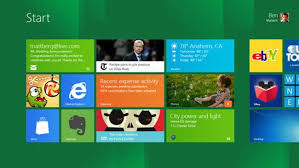Windows 8 Consumer Preview’s Impact on PC Performance
By admin on May 9, 2012 in Software, Windows 8
 On February 29, 2012, Microsoft released the long-awaited Consumer Preview of Windows 8. With it, the company not only unveiled a new Metro interface and several features to improve the overall Windows experience, but also assured consumers that its newest operating system (OS) would provide enhanced system performance, no matter if they are using high- or low-end machines.
On February 29, 2012, Microsoft released the long-awaited Consumer Preview of Windows 8. With it, the company not only unveiled a new Metro interface and several features to improve the overall Windows experience, but also assured consumers that its newest operating system (OS) would provide enhanced system performance, no matter if they are using high- or low-end machines.
Journalists, developers and early adopters have tested Windows 8 Consumer Preview and have been quite positive about the new OS and its impact on PC performance, but the question remains—is Windows 8 really living up to the hype? There are actually still a few kinks in the OS, which, if included in the retail version, could disappoint PC users.
Great Benefits of Microsoft’s Newest OS
The bulk of initial feedback on Windows 8 Consumer Preview has been encouraging, with some going so far as to hail the new OS as a game changer. The brand new Metro interface sports a sleek design and is optimized for touch-screen devices, providing a clear benefit to those who are on-the-go. However, Microsoft has made it clear that Windows 8 Consumer Preview also works well on traditional PCs.
In that same vein, the new OS encourages the use of apps that we have all come to know and love from our smartphone use. And thanks to cloud connection via Windows Live SkyDrive, users can sign into any device running Windows 8 and be able to instantly access their personal settings and apps.
In addition to these new features, the new OS displays some obvious benefits over Windows 7. For example, benchmark tests (results pictured below) showed that Windows 8 is able to boot up about three times faster than its predecessor. Plus, gamers and those who enjoy streaming videos will enjoy the fact that Windows 8 Consumer Preview’s reduced memory usage increases frames per second.
Where There’s Room for Improvement
Despite these positives, Microsoft needs to make several tweaks to the OS before its official launch in October. First, some have pointed out the fact that Windows 8 Consumer Preview works better on newer tablets rather than on traditional desktop PCs and laptops, which many consumers still rely on heavily. Meanwhile, others trialing Windows 8 Consumer Preview have commented that the new Metro interface is almost too much of a departure from the traditional OS interface, causing a lot of confusion for average PC users.
There are a few other bugs, mainly related to third-party applications, in the current build of the OS. For example, after installing 80 common programs, including Skype and Live Messenger, the overall speed of the PC reduced noticeably. Microsoft has introduced a comprehensive Task-Manager that shows the impact of start-up applications; however, much like previous versions of Windows, this still requires users to manually switch applications off to regain system performance. This can be cumbersome and not obvious to many.
The Metro applications, which operate similarly to those found in Apple’s iPads and iPhones and Google’s Android OS, also present a potential issue in terms of PC performance. During benchmark testing, apps that were specifically closed were found to be still running silently in the background. While only the most critical apps were still active, others were still consuming valuable memory. This drain on resources—and its detrimental impact on system performance—is something that most users wouldn’t be aware of. It’s important to note that a restart purges the memory of all app states, but many users go a long time without ever shutting down or restarting their PCs.
A Hopeful Future
All this being said, these observations are based on Windows 8 Consumer Preview and do not reflect Microsoft’s final product. The new OS has significantly improved boot-up times and has reduced memory usage, allowing for a smoother gaming or video streaming experience. However, there are issues with the Metro apps that can lead to decreased system performance that Windows should look to amend in the final version. If these changes are made, Windows 8 may indeed prove to be a game changer after all.
This is a guest post by Sandro Villinger, Technical Product Consultant, TuneUp blog.

Post a Comment